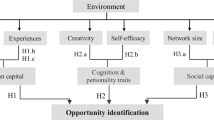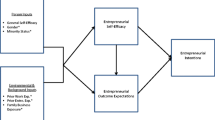Abstract
Part-time entrepreneurship—the process of starting a business while retaining a ‘day job’ in an existing organization—can be considered an entry strategy into full-time entrepreneurship rather than a form of entrepreneurship in itself. With the goal of examining how the entrepreneurial ability relates to the transition from part-time to full-time entrepreneur, we integrate insights from utility maximization theory with logic from the resource capability theory, then test hypotheses through simulation analysis of mathematical models and the empirical analysis of questionnaire data. The key findings of the study emphasize that part-time entrepreneurs with higher Resource allocation ability are more likely to turn into full-time entrepreneurs, and the opportunity-recognition ability is not verified by this assumption. Besides, Entrepreneurial resource positively regulates the relationship between two types of entrepreneurial ability and the transformation intention.


Similar content being viewed by others
References
Al-Zubeidi M (2013) Higher education and entrepreneurship: the relation between college educational background and small business success in Texas. Pm R 5(9):302–303
Alvarez SA, Busenitz LW (2001) The entrepreneurship of resource-based theory. J Manag 27(6):755–775
Arthurs JD, Busenitz LW (2006) Dynamic capabilities and venture performance: the effects of venture capitalists. J Bus Ventur 21(2):195–215
Baron RM, Kenny DA (1986) The moderator–mediator variable distinction in social psychological research: conceptual, strategic and statistical considerations. J Pers Soc Psychol 51(6):1173–1182
Baum JR, Locke EA (2004) The relationship of entrepreneurial traits, skill, and motivation to subsequent venture growth. J Appl Psychol 89(4):587
Block JH, Landgraf A (2013) The intention of part-time entrepreneurs to become full-time entrepreneurs: the role of financial and non-financial motives. Soc Sci Electron Publ 10:1–23
Block JH, Landgraf A (2014) Transition from part-time entrepreneurship to full-time entrepreneurship: the role of financial and non-financial motives. Int Entrep Manag J 12(1):1–24
Bögenhold D, Klinglmair A (2016) Entrepreneurship and hybrid self-employment. Fac Manag Econ 18(3):127–140
Brown S, Dietrich M, Ortiz-Nuñez A, Taylor K (2011) Self-employment and attitudes towards risk: timing and unobserved heterogeneity. J Econ Psychol 32(3):425–433
Burke AE, FitzRoy FR, Nolan MA (2008) What makes a die-hard entrepreneur? Beyond The ‘employee or entrepreneur’ dichotomy. Small Bus Econ 31(2):93–115
Cai L, Tang SQ, Ma YL, Gao X (2014) Research on the relationship between entrepreneurial learning, entrepreneurial ability and new enterprise performance. Sci Res 32(08):1189–1197
Castells M (2000) The rise of the network society. Economy, society and culture. Blackwell, Malden
Chang CH, Ferris DL, Johnson RE, Rosen CC, Tan JA (2012) Core self-evaluations: a review and evaluation of the literature. J Manag 38:81–128
Cramer JS, Hartog J, Jonker N et al (2002) Low-Risk aversion encourages the choice for entrepreneurship: an empirical test of a truism. J Econ Behav Organ 48(1):29–36
Dahalan N, Jaafar M, Rosdi SAM (2013) Local community readiness in entrepreneurship: do gender differ in searching business opportunity. Proc Soc Behav Sci 91:403–410
Dilli S, Westerhuis G (2018) How institutions and gender differences in education shape entrepreneurial activity: a cross-national perspective. Small Bus Econ 51:1–22
Dixit AK, Pindyck RS (1994) Investment under uncertainty. Princeton University Press, Princeton
Dong BB (2014) Is the risk need to be balanced? The intermediary role of risk-bearing and performance inverted U-type relationship and entrepreneurial ability of new enterprises. Manag World 01:120–131
Douglas EJ, Shepherd DA (2000) Entrepreneurship as a utility maximizing response. J Bus Ventur 15(3):231–251
Dyer JH, Gregersen HB, Christensen C (2010) Entrepreneur behaviors, opportunity recognition, and the origins of innovative ventures. Strateg Entrep J 2(4):317–338
Folta TB (1998) Governance and uncertainty: the tradeoff between administrative control and commitment. Strateg Manag J 19:1007–1028
Folta TB, Delmar F, Wennberg K (2010) Hybrid entrepreneurship. Manage Sci 56:253–269
Grabowski U, Kittelwegner E (2017) Book review: a general theory of entrepreneurship: the individual-opportunity nexus. Int J Global Small Bus 1(1):319–322
Huang YC, Huang XY (2018) The heterogeneous competency characteristics of entrepreneurs and the supply of entrepreneurship policies: based on competency theory. Sci Technol Progr Countermeas 35(11):117–123
Huang YC, Lei YY (2017) Study on the composing system of entrepreneurial competence in emerging industries—exploratory analysis based on entrepreneurial opportunity theory. Nanjing Soc Sci 02:47–53
Hugonnier JN, Morellec E (2007) Real options and risk aversion (Swiss Finance Institute Research Paper Series). Swiss Finance Institute, Geneva
Judge TA, Erez A, Bono JE, Thoresen CJ (2003) The core self-evaluations scale: development of a measure. Pers Psychol 56:303–331
Kaiser CP (1990) Entrepreneurship and resource allocation. East Econ J 16(1):9–20
Kalleberg AL (2000) Nonstandard employment relations: part-time, temporary and contract work. Ann Rev Sociol 26(1):341–365
Kauder E (1966) Metaphysicians of economics. Book reviews: a history of marginal utility theory. Science 151(3716):1377
Krueger NF (2000) The cognitive infrastructure of opportunity emergence. Entrep Theory Pract 24:185–206
Luc S, Chirita GM, Delvaux E, Kepnou AK (2018) Hybrid entrepreneurship: employees climbing the entrepreneurial ladder. Acad Manag Ann Meet Proc 04:142–153
Ma YF (2017) The influence of part-time entrepreneurial motivation on leaving entrepreneurial behavior. Anhui University of Finance and Economics, Bengbu
Ma HJ, Dong BB, Ge BS (2014) Research on the relationship between entrepreneurial competence, dynamic capabilities and competitive advantage of enterprises. Sci Sci 32(03):431–440
Mcgee JE, Peterson M, Mueller SL et al (2010) Entrepreneurial self-efficacy: refining the measure. Entrep Theory Pract 33(4):965–988
Mcgrath RG (2009) Entrepreneurship, small firms and wealth creation: a framework using real options reasoning. Social Science Electronic Publishing, Rochester
Modigliani F, Miller MH (1959) The cost of capital, corporation finance, and the theory of investment: reply. Am Econ Rev 49(4):655–669
Moren L, Minniti M (2006) The Effect of aging on entrepreneurial behavior. J Bus Ventur 21(2):177–194
Moren L, Shepherd DA, Douglas EJ (2002) Employment or self-employment: a dynamic utility-maximizing model. J Bus Ventur 17(3):189–210
Petrova K (2005) Part-time entrepreneurship and wealth effects: new evidence from the panel study of entrepreneurial dynamics. In: 50th ICSB conference, Washington, no. 7, pp 15–18
Petrova K (2010) Part-time entrepreneurship: theory and evidence. Atl Econ J 38(4):463–464
Petrova K (2011) Part-time entrepreneurship, learning and ability. J Manag Policy Pract 12(1):64–75
Petrova K (2012) Part-time entrepreneurship and financial constraints: evidence from the panel study of entrepreneurial dynamics. Small Bus Econ 39(2):473–493
Raffiee J, Feng J (2014) Should I quit my day job? A hybrid path to entrepreneurship. Acad Manag J 57(4):936–964
Roberts K, Weitzman ML (1981) Funding criteria for research, development, and exploration projects. Econometrica 49:1261–1288
Sardeshmukh SR, Smithnelson RM (2011) Educating for an entrepreneurial career: developing opportunity-recognition ability. Aust J Career Dev 20(3):47–55
Tang J, Jiang YF (2008) The theoretical construction and empirical test of the concept of entrepreneurial ability. Sci Sci Technol Manag 08:52–57
Thorgren S, Wincent J (2016) Hybrid entrepreneurs’ second-step choice. J Bus Ventur Insights 5:14–18
Thorgren S, Nordström C, Vincent J (2014) Hybrid entrepreneurship: the importance of passion. Baltic J Manag 9(3):314–329
Tornikoski ET, Viljamaa A, Varamäki E (2015) Hybrid entrepreneurship during retirement: comparison of motives and aspirations. In: Sappleton N, Lourenço F (eds) Entrepreneurship, self-employment and retirement. Palgrave Macmillan, London, pp 187–208
Trigeorgis L (1996) Real options: managerial flexibility and strategy in resource allocation. MIT Press, Cambridge
Viljamaa A, Varamäki E, Joensuusalo S (2018) Best of both worlds? Persistent hybrid entrepreneurship. J Enterp Cult 25(4):339–359
Vivarelli M (2004) Are all the potential entrepreneurs so good? Small Bus Econ 23(1):41–49
Wang DX, Ye QY (2016) A review of research on decision-making process and multi-layer influencing factors of employees’ resignation and entrepreneurship. Econ Manag 11:187–199
Wernerfelt B (1984) A resource-based view of the firm. Strateg Manag J 5(2):171–180
Wennberg K, Folta TB, Delmar F (2006) A real options model of stepwise entry into self-employment. Front Entrep Res 26(6):3
Xi G, Block JH, Lasch F (2017) Mode of entry into hybrid entrepreneurship: new venture start-up versus business takeover. Iza discussion paper
Ye MH, Wang W, Zhang YC (2011) Entrepreneurial process model based on system theory. Sci Res Manag 32(11):123–130
Zhao H, Seibert SE, Lumpkin G (2010) The relationship of personality to entrepreneurial intentions and performance: a meta-analytic review. J Manag 36(2):381–404
Author information
Authors and Affiliations
Corresponding author
Additional information
Publisher's Note
Springer Nature remains neutral with regard to jurisdictional claims in published maps and institutional affiliations.
Rights and permissions
About this article
Cite this article
Sun, J., Huang, Y., Su, D. et al. Data mining and analysis of part-time entrepreneurs from the perspective of entrepreneurial ability. Inf Syst E-Bus Manage 18, 455–484 (2020). https://doi.org/10.1007/s10257-019-00425-8
Received:
Revised:
Accepted:
Published:
Issue Date:
DOI: https://doi.org/10.1007/s10257-019-00425-8




